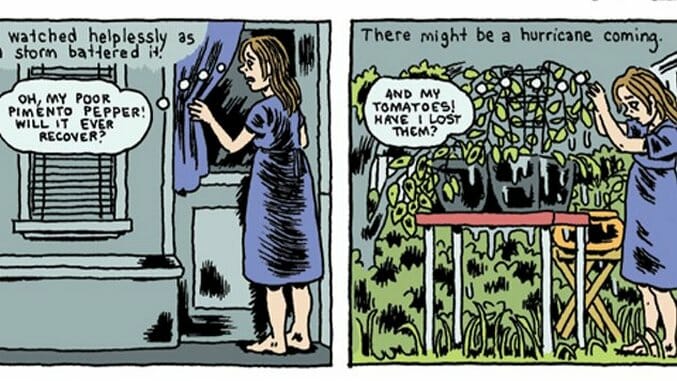Gabrielle Bell on Ego, Animals and Her Intimate New Graphic Novel, Everything Is Flammable

Gabrielle Bell’s comics arrive from unexpected angles. Whether her stories are dream-like fiction or drawn from life, Bell avoids the predictable, leading the reader to sucker punch emotional truths that emerge organically from words and pictures. Her work is subtle in its execution and grand in its scope, and never quite goes where one might expect.
Over the decades, the focus of Bell’s work has shifted slightly: the off-beat surrealism of her shorter works collected in 2009’s Cecil and Jordan in New York has given way to the nuanced nonfiction of books like 2012’s The Voyeurs. Bell’s latest confessional, Everything is Flammable from Uncivilized Books, chronicles her experience after a fire consumes her mother’s California house. The graphic novel experiments with structure, telling Bell’s story along with several other narratives that serve as counterpoints. It’s a deft narrative, a moving story with a tactile sense of place throughout.
Paste talked with Bell at a coffee shop in Brooklyn as she sketched a street scene. An edited version of the conversation follows, as both parties free-associated about cats to a considerable extent.![]()
Paste: A few months ago, you did a piece for Vice about adopting dogs, and dogs also play a substantial role in Everything is Flammable. Is that coincidental? Is it difficult to draw dogs relative to people?
Gabrielle Bell: It’s gotten easier to draw them. As far as the book goes, everyone’s got dogs up there. I’ve always loved dogs. I wanted a dog for a long time, but I’ve never been able to have them.
I watched a documentary recently about dogs, and came to understand how remarkable it is that dogs are basically bred to be our friends. Over many generations, they were taught to want to be around people. It’s kind of sick, in a way [laughs]. The same is not true of cats. I’m cat-sitting right now, and he’s a wild animal. I mean, he’s pretty sweet, and he’ll sit on my lap and purr and let me rub his belly, but when he’s in a mood, he’ll just come in and scratch me and mess with me. With a dog, it seems like you could train them not to do that. A cat, it’s more like a person, a bad boyfriend or something.
There’s something pretty straightforward about dogs. But I think it’s a coincidence. It could be anything; one needs something to pay attention to, so I started paying attention to dogs.
Paste: Everything is Flammable is largely about you dealing with the aftermath of a fire in your mother’s home. When, as all of that was happening, did you realize that it was going to be a book?
Bell: I know there was a moment when I realized that, but I don’t exactly remember when. I don’t remember what it was that inspired it.

Everything Is Flammable Interior Art by Gabrielle Bell
-

-

-

-

-

-

-

-

-

-

-

-

-

-

-

-

-

-

-

-

-

-

-

-

-

-

-

-

-

-

-

-

-

-

-

-

-

-

-

-












































